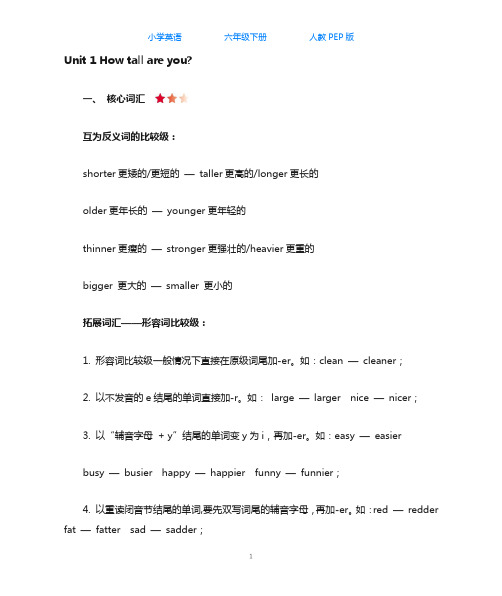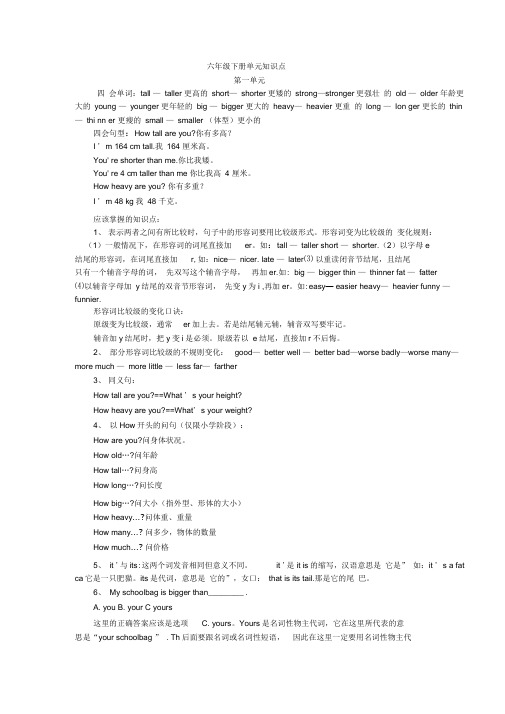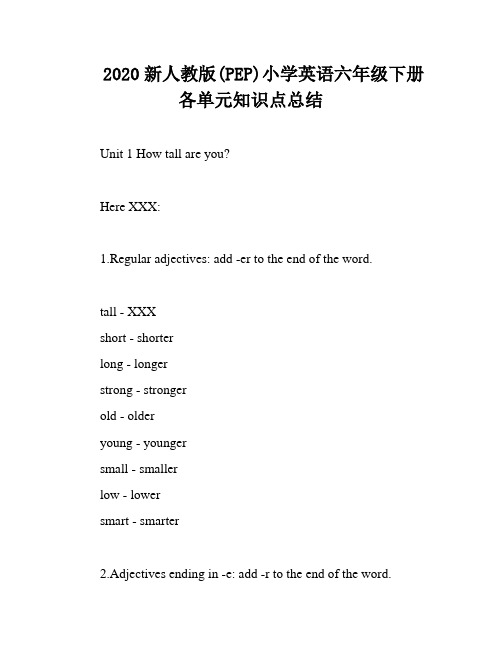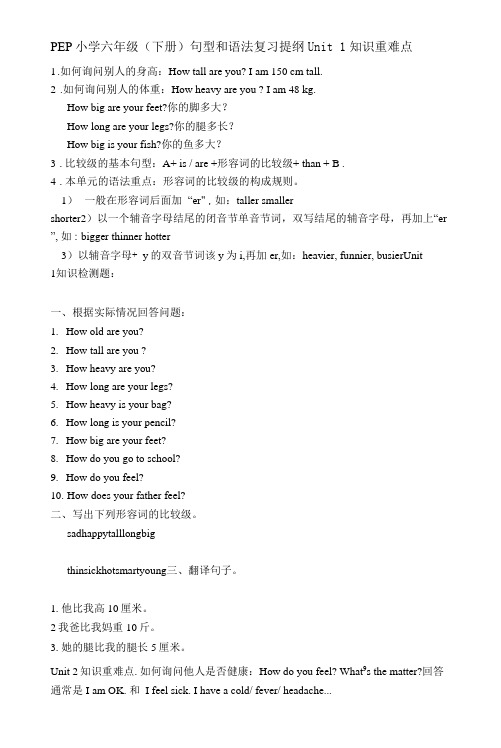pep人教版六年级下册英语14单元复习
人教PEP英语六年级下册U1-U4全册知识清单(考点梳理)

Unit 1 How tall are you?一、核心词汇互为反义词的比较级:shorter更矮的/更短的—taller更高的/longer更长的older更年长的—younger更年轻的thinner更瘦的—stronger更强壮的/heavier更重的bigger 更大的—smaller 更小的拓展词汇——形容词比较级:1. 形容词比较级一般情况下直接在原级词尾加-er。
如:clean —cleaner;2. 以不发音的e结尾的单词直接加-r。
如:large —larger nice —nicer;3. 以“辅音字母+ y”结尾的单词变y为i,再加-er。
如:easy —easierbusy —busier happy —happier funny —funnier;4. 以重读闭音节结尾的单词,要先双写词尾的辅音字母,再加-er。
如:red —redder fat —fatter sad —sadder;5. 不规则变化。
如:good —better bad —worse many —more little —less6. 多音节词和部分双音节词则在词前加more。
如:beautiful —more beautiful exciting —more exciting二、了解词汇dinosaur恐龙hall大厅metre米(美式英语: meter) than比both两个都kilogram千克;公斤countryside乡村lower(low的比较级)更低地shadow阴影;影子smarter(smart的比较级)更聪明的become开始变得;变成三、核心句型1. —How tall are you?你有多高?—I’m 1.64 metres. 我身高1.64米。
2. —What size are your shoes, Mike?迈克,你穿多大号的鞋?—Size 7. 7号。
3. —How heavy are you?你体重多少?—I’m 48 kilograms. 我体重48公斤。
2024人教版六年级下册英语知识点归纳总结

2024人教版六年级下册英语知识点归纳总结Unit 1: A Busy DayVocabulary: busy, wake up, brush, teeth, wash, face, comb, hair, get dressed, have breakfast, go to school, lunch, do, homework, play, homeGrammar: Present Simple TensePattern: What do you do every day?Unit 2: At the ZooVocabulary: zoo, elephant, giraffe, lion, tiger, monkey, panda, koala, kangaroo, polar bear, penguinGrammar: Plural Form of NounsPattern: There are some + Plural nounsUnit 3: On VacationVocabulary: vacation, beach, mountain, forest, lake, river, island, camp, swim, surf, sunbathe, hike, fish, barbecueGrammar: Present Continuous TensePattern: What is she/he doing?Unit 4: In the CityVocabulary: city, museum, park, restaurant, library, hospital, hotel, post office, police station, theater, store Vocabulary: DirectionsGrammar: Prepositions of PlacePattern: Where is the library?Unit 5: At the FarmVocabulary: farm, sheep, pig, cow, horse, duck, goat, chicken, dog, catGrammar: Countable and Uncountable NounsPattern: There is / There areUnit 6: Fun with ScienceVocabulary: science, experiment, microscope, telescope, rocket, magnet, electricity, battery, solar system, planet, starGrammar: Comparative and Superlative AdjectivesPattern: The sun is bigger than the earth.Unit 7: Music and ArtVocabulary: music, instrument, guitar, piano, violin, drum, flute, trumpet, singer, dancer, painter, sculptor Grammar: Present Perfect TensePattern: Have you ever been to a concert?Unit 8: Around the WorldVocabulary: country, capital, continent, flag, ocean, desert, forest, mountain range, river, populationGrammar: Adverbs of FrequencyPattern: I often do my homework in the evening.Unit 9: Helping OthersVocabulary: help, volunteer, donation, charity, needy, homeless, orphanage, disaster, relief, campaignGrammar: Modal VerbsPattern: Can you help me with my homework?Unit 10: In the FutureVocabulary: future, robot, technology, invention, space, colony, exploration, discovery, communication, transportation Grammar: Future TensePattern: What will life be like in 50 years?In the sixth grade English curriculum for 2024, students will learn a variety of vocabulary, grammar, and patterns to improve their language skills. The vocabulary covers topicssuch as daily routines, animals, vacation, city locations, farm animals, science, music and art, geography, and social issues. The grammar focuses on tenses, plurals, prepositions, adjectives, adverbs, and modal verbs. These language points will help students communicate effectively in various real-life situations.The first unit, "A Busy Day," introduces vocabulary related to daily routines, such as waking up, brushing teeth, and going to school. Students also learn the present simple tense and how to talk about their daily activities using phrases like "What do you do every day?"In "At the Zoo," students expand their animal vocabulary and learn about the plural form of nouns. They practice using sentences like "There are some pandas in the zoo" to describe the animals they see.The "On Vacation" unit introduces vocabulary related to different vacation destinations and activities such asswimming, surfing, and hiking. Students also learn the present continuous tense to talk about what they are doing on their vacation."In the City" teaches students about locations in a city and how to give and understand directions. They learn prepositions of place and practice asking questions like "Where is the library?"The "At the Farm" unit focuses on farm animals and the distinction between countable and uncountable nouns. Students learn to use sentences like "There are ducks in the farm" and "There is milk in the fridge" to describe what they see and have."Fun with Science" introduces scientific vocabulary and the comparative and superlative forms of adjectives. Students learn to compare the sizes of objects using phrases like "The sun is bigger than the earth."In "Music and Art," students learn about musical instruments, artists, and the present perfect tense. They practice using sentences like "I have never been to a concert" to talk about their experiences."Around the World" teaches students about geography and the adverbs of frequency. They practice using phrases like "I often visit my grandparents in the summer" to talk abouttheir habits and routines."Helping Others" introduces vocabulary related to helping and volunteering, as well as the use of modal verbs. Students learn to ask for help and offer assistance using phrases like "Can you help me with my homework?"The final unit, "In the Future," explores vocabulary related to future developments and technology. Students learn about the future tense and practice using phrases like "What will life be like in 50 years?"Overall, the sixth grade English curriculum for 2024 aims to provide students with a solid foundation in vocabulary and grammar to help them communicate effectively in various real-life situations. Through engaging and interactive activities, students will have the opportunity to practice and apply the language points they have learned, building their confidence and fluency in English.。
六年级英语14课的知识点

六年级英语14课的知识点六年级英语14课是一个重要的学习单元,其中包括了许多重要的知识点。
本文将为您详细介绍这些知识点,帮助您更好地掌握六年级英语。
一、课文内容概述第14课的课文主要围绕着“我的假期计划”展开。
学生们将学习如何表达他们的假期计划,并且学习如何用英语写一份假期计划书。
二、词汇与短语在本课课文中,学生将学习一些重要的词汇与短语,以便更好地理解和运用课文内容。
以下是一些重要的词汇与短语:1. holiday - 假期2. plan - 计划3. trip - 旅行4. beach - 海滩5. visit - 参观6. city - 城市7. explore - 探索8. museum - 博物馆9. nature - 自然10. hiking - 徒步旅行11. adventure - 冒险12. relax - 放松三、语法知识在第14课中,学生将学习一些重要的语法知识,以便更好地运用英语表达自己的假期计划。
以下是一些重要的语法知识点:1. 一般将来时 (Simple Future Tense):用于表达将来某个时间会发生的动作或状态。
例如:I will visit my grandparents during the summer vacation.2. 常用的时间状语 (Common Time Expressions):用于对将来发生的动作进行时间的具体界定。
例如:tomorrow, next week, in July, during the summer vacation 等等3. 陈述句与疑问句的转换:将陈述句转换为疑问句时,需要在句首加上助动词或者疑问词。
例如:She will go hiking during the holiday. -> Will she go hiking during the holiday?四、听力训练在学习英语的过程中,培养良好的听力技巧非常重要。
PEP六年级下册期末知识点及总复习最新

六年级下册单元知识点第一单元四会单词:tall —taller 更高的short—shorter更矮的strong—stronger更强壮的old —older 年龄更大的young —younger 更年轻的big —bigger 更大的heavy—heavier 更重的long —Ion ger 更长的thin —thi nn er 更瘦的small —smaller (体型)更小的四会句型:How tall are you?你有多高?I ' m 164 cm tall.我164 厘米高。
You' re shorter than me.你比我矮。
You' re 4 cm taller than me你比我高4 厘米。
How heavy are you? 你有多重?I ' m 48 kg我48 千克。
应该掌握的知识点:1、表示两者之间有所比较时,句子中的形容词要用比较级形式。
形容词变为比较级的变化规则:(1)一般情况下,在形容词的词尾直接加er。
如:tall —taller short —shorter.(2)以字母e结尾的形容词,在词尾直接加r,如:nice—nicer. late —later⑶以重读闭音节结尾,且结尾只有一个辅音字母的词,先双写这个辅音字母,再加er.如: big —bigger thin —thinner fat —fatter⑷以辅音字母加y结尾的双音节形容词,先变y为i ,再加er。
如:easy— easier heavy—heavier funny —funnier.形容词比较级的变化口诀:原级变为比较级,通常er加上去。
若是结尾辅元辅,辅音双写要牢记。
辅音加y结尾时,把y变i是必须。
原级若以e结尾,直接加r不后悔。
2、部分形容词比较级的不规则变化:good—better well —better bad—worse badly—worse many—more much —more little —less far—farther3、同义句:How tall are you?==What ' s your height?How heavy are you?==What' s your weight?4、以How开头的问句(仅限小学阶段):How are you?问身体状况。
2020新人教版(PEP)小学英语六年级下册各单元知识点总结

2020新人教版(PEP)小学英语六年级下册各单元知识点总结Unit 1 How tall are you?Here XXX:1.Regular adjectives: add -er to the end of the word.tall - XXXshort - shorterlong - longerstrong - strongerold - olderyoung - youngersmall - smallerlow - lowersmart - smarter2.Adjectives ending in -e: add -r to the end of the word.large - largerlate - latersimple - simplersafe - safer3.Adjectives XXX: double the final consonant and add -er.big - biggerXXX - XXXfat - fattersad - sadderhot - hotterwet - wetter4.Adjectives ending in -y: change the -y to -i and add -er.happy - happierheavy - XXXXXX - funnierangry - angrierXXX - XXXwindy - windierbusy - busierearly - earlierXXX:dinosaur。
hall。
than。
both。
meter。
kilogram。
size。
feet。
wear。
countryside。
shadow。
e.Here XXX:1.Asking about age。
height。
weight。
etc.How old are you?How tall are you?How heavy are you?I am (age) years old。
PEP小学六年级下册复习总结提纲

PEP小学六年级(下册)句型和语法复习提纲Unit 1知识重难点1.如何询问别人的身高:How tall are you? I am 150 cm tall.2.如何询问别人的体重:How heavy are you ? I am 48 kg.How big are your feet?你的脚多大?How long are your legs?你的腿多长?How big is your fish?你的鱼多大?3.比较级的基本句型:A+ is / are +形容词的比较级+ than + B .4.本单元的语法重点:形容词的比较级的构成规则。
1)一般在形容词后面加“er",如:taller smallershorter2)以一个辅音字母结尾的闭音节单音节词,双写结尾的辅音字母,再加上“er ”, 如:bigger thinner hotter3)以辅音字母+ y的双音节词该y为i,再加er,如:heavier, funnier, busierUnit1知识检测题:一、根据实际情况回答问题:1.How old are you?2.How tall are you ?3.How heavy are you?4.How long are your legs?5.How heavy is your bag?6.How long is your pencil?7.How big are your feet?8.How do you go to school?9.How do you feel?10.How does your father feel?二、写出下列形容词的比较级。
sadhappytalllongbigthinsickhotsmartyoung三、翻译句子。
1.他比我高10厘米。
2我爸比我妈重10斤。
3.她的腿比我的腿长5厘米。
Unit 2知识重难点.如何询问他人是否健康:How do you feel? What9s the matter?回答通常是I am OK.和I feel sick. I have a cold/ fever/ headache...1.当你得知别人生病了,别忘了说一声:I am sorry to hear that.2.动词have用在第三人称单数时,要注意人称变化的搭配:I have a bad cold.He has a bad cold.You have a fever.She has a fever.3.如何表达自己各种情绪的心里状态并陈述产生某种心情的原因:I am excited because I am going on a big trip.I feel sad because I failed my math test.Unit 2知识检测题:一、根据答句写问句:1、?I am going to buy a comic book.2.?She is excited.3.?Because she is going to Beijing tomorrow.4.?Yes, my father works in a car company .5.?No, she doesn't live in Dongguan.二、Rearrange the words.(句子排序)10%where on you go your holiday did1.matter with you whafs the92.the do you what on weekend do usually9 •you much am thanI taller3.visit I'm tomorrow my going grandparents toUnit 3和Unit4知识重难点:一般过去时定义:表示过去某时发生的动作或存在的状态。
Unit14单元基础复习(单元测试)人教PEP版英语六年级下册
Unit 1词句过关1. 更年轻的2. 更年长的3.更高的4. 更矮的;更短的5.更长的6. 更瘦的7. 更重的8. 更大的9. 更小的10. 更强壮的11.恐龙__________12.大厅______________ 13.两个都_____________ 14.米___________15.centimeter_____________16.多重17. 多高18. 什么尺码19.越来越低20. 越来越长21.最高的________________1.Mike比我重。
他看起来很强壮。
Mike is than me. He very . 2.你的脚比我的大。
我穿37号的鞋。
Your are than mine. My shoes are 37. 3.他看起来比以前更年轻了。
He looks than before.4.我妹妹比我矮比我瘦。
My sister is and than me.5.你有多高?are you?6.你的脚比我的大。
Your feet are mine.7.张鹏是我们班最高的。
Zhang Peng is __________ _________ _________ our class.8.—你穿多大号的鞋?—37号。
—What _______ _______ your shoes?— _______ _______.9.王甜看起来像她的妈妈。
Wang Tian her mother.连词成句1.taller,both,us,he,of,than,is(.) _______________________________2.shorter,my,you’re,sister,than(.)_____________________________3.tallest,Sam,student,in his class,the,is(.)______________________________4.grow,every,older,we,day(.)________________________________5.shoes,mine,your,bigger,are,than(.)____________________________6.are,shoes,window,those,nice,in,the(.)____________________________7.lower,sun,gets,lower,the,and(.)____________________________8.size,what, your,shoes,are(?)____________________________Unit 2词句过关(动词和词组写过去式)1.睡觉2.洗__________3.观看4.待在5. 洗我的衣服6. 待在家里7. 看电视8. 看书9. 看电影10. 感冒11. 去划船12.打扫我的房间13. 昨天14. 以前15. 周末16. 昨晚17. 上星期一18. 前天19.上周末1.上周末,我们喝了下午茶。
人教版英语六年级下十四单元知识点总结
十四单元总结一、单词。
国家:China 中国America 美国Japan 日本Germany 德国France 法国Australia 澳大利亚Canada 加拿大Britain 英国Russia 俄国Egypt 埃及Spain 西班牙语言:Chinese 中文English 英语Japanese 日语German 德语French 法语Russian 俄语Egyptian 阿拉伯语Spanish 西班牙语洲:Europe 欧洲Asia 亚洲Africa 非洲Oceania 大洋洲North America 南美洲South America 北美洲著名景点:the Great wall 长城pyramid 金字塔koala 考拉kangaroo 袋鼠Disneyland 迪士尼乐园Red square 红场Eiffel Tower 埃菲尔铁塔cherry blossom 樱花二、句子1、Look at Bob.Where is he from?He is from Spain.Where is Spain?It’s in Europe.What language do people speak in Spain?They usually speak Spanish.2、Who is she/he?She is Linda.Where is she/he from?She is from China.Are there any famous places in the country?Yes, there is.China is famous for the Great wall.3、What day is our National Day?It’s on October 1st.How do people celebrate it?On this day, People usually go to Tian’anmen Square.4、Who is he?He’s Hans Andersen.What did he do?He was a writer.Why was he famous?He was famous because he wrote many stories for children.I like these stories.。
完整word版PEP英语六年级上下册10个单元黑体词句子默写复习用
PEP7 Unit 11.科学博物馆___________________2.邮局___________________3.书店_______________4.电影院____________5.医院___________________6.十字路口___________________7.左转________________8.右转___________________ 9.直走___________________10.博物馆的商店在哪儿?________________________________11.在大门附近。
________________________________________12.我们怎么到那儿?____________________________________13.到书店左转。
________________________________________裁剪线PEP7 Unit 2____________ 乘飞机乘公共汽车____________ 3.1.步行____________ 2.____________ ____________6.乘地铁乘出租车4.____________5.乘船____________________________________ 7.黄灯减速并停下来________________________________________ 红灯停下并等待8.________________________________________绿灯行9.________________________________________ 你怎么来学校的?10.________________________________________11.通常,我走着来。
_________________________________ 。
12.在美国骑自行车的人必须戴(头盔)________________________________________________________________________________别闯红灯!13.________________________________________我必须注意交通信号灯!14.PEP7 Unit 31.拜访我的祖父母___________________2.看电影___________________3.去旅行_______________4.去超市___________________5.傍晚______________6.在今晚_________7.明天__________8.下周_____________9.明信片__________10.词典_______________11.连环画册_____________12.单词书_______________13.你明天打算做什么?________________________________________14.我要上美术课。
六年级英语下学期(PEP人教版)全册单元知识点复习资料
Unit 1 How tall are you?重点词汇:1、Younger 更年轻的young的比较级young 的最高级?例句:我的妈妈比爸爸更年轻。
2、older 更年长的old的比较级old的最高级?elder eldest 例句:汤姆比吉姆更年长。
3、taller 更高的tall 的比较级tall的最高级?例句:我比我的弟弟高。
4、shorter 更矮的,更短的short的比较级,short的最高级?例句:这把尺子比那把尺子短。
5、longer 更长的long的比较级例句:她的头发比我的长。
6、thinner 更瘦的thin的比较级反义词?例句:这只猴子比大象瘦7、heavier 更重的heavy的比较级反义词?例句:迈克比他妹妹更重。
8、bigger 更大的big的比较级反义词?例句:这只兔子比那只兔子大的多。
This rabbit is much bigger than that one .9、smaller 更小的small 的比较级例句:我的梨子比你的小。
My pear is smaller than yours.10、strong 更强壮的strong的比较级反义词?例句:我哥哥比我强壮。
11、countryside n. 不可数名词乡村同义词:例句:我的祖父母生活在一个小乡村。
12、lower 更低的low的比较级反义词?例句:这栋楼比那栋楼低。
This building is lower than that one.13、shadow n. 可数名词阴影,影子例句:你能看到你的影子吗?14、smarter 更聪明的smart的比较级例句:你变得越来越聪明了。
You are getting smarter and smarter.15、become v. 开始变得,变成例句:这个女孩想成为一名演员。
This girl wants to become an actress.重点短语:How tall 多高how heavy 多重how old 多大what size 多大号In this hall 在这个厅里both of 两个都over there 在那边have a look 看一看Go down 下降重点句型:①形容词的最高级:最高级通常用于3人或者3人以上的人或事物之间的比较。
- 1、下载文档前请自行甄别文档内容的完整性,平台不提供额外的编辑、内容补充、找答案等附加服务。
- 2、"仅部分预览"的文档,不可在线预览部分如存在完整性等问题,可反馈申请退款(可完整预览的文档不适用该条件!)。
- 3、如文档侵犯您的权益,请联系客服反馈,我们会尽快为您处理(人工客服工作时间:9:00-18:30)。
第一单元
四会单词:
tall—taller更高的short—shorter 更矮的strong—stronger更强壮的old—older 年龄更大的young—younger 更年轻的big—big g er更大的heavy—heav i er 更重的long—longer 更长的thin—thin n er 更瘦的small—smaller 更小的o ver there在那边have a look看一看go down落下四会句型:
1.How tall are you?询问别人身高
I’m ...metres/cm(tall).
2.How heavy are you?询问别人体重。
I’m ...kilograms/tons(heavy).千克和吨
3.What size are your shoes?询问鞋的尺码
My shoes are size 37./I wear size 37.我穿37码.
4.主+be+(具体数量)+比较级+than+作比较的对象。
You’re (4 cm)taller than me.你比我高(4厘米)。
5.Your feet are bigger than mine.
(名词性物主代词my feet) 你的脚比我的脚大
My hands are bigger than your s. 我的手比你的手大。
6.That’s the tall est dinosaur.那是最高的恐龙。
7.It’s getting lower and lower变得越来越低。
第二单元
一.短语
clean ed my room 打扫房间 wash ed my clothes 洗衣服
stay ed at home 待在家 watch ed TV 看电视 go/went boating 划船 read/read a book 读书 see/saw a film 看电影 have/had a cold 感冒 sleep/slept 睡觉 climbed mountains 爬山 cooked dinner 做饭 do/did something else 做了一些其他的事 film magazine 电影杂志 drink/drank tea 喝茶 all weekend 整个周末 talk about 谈论
二.句子 1. How was your weekend?你周末过得怎么样?
( It was )good/fine/ok, thank you.很好,谢谢!
2. What did you do last weekend (上周末)、the day before yesterday (前天), last Monday (上周一),last night (昨
晚)....你上个周末干了什么(用动词短语的过去式回答)
3.I stayed at home with your grandma.我和你奶奶待在家里
4. Did you do any
thing else?你还做了其他什么事吗? 5.I want to buy the new film magazine.我想买期新的电影杂志。
6.Did you see a film?你看电影了吗?(一般疑问句后面用原形) Yes ,I did(肯)/No,I didn ’t (否) .
7.I didn ’t sleep all night.我一晚都没睡觉
8.Was it interesting ?它有趣吗?Yes ,it was/No,it wasn ’t
一、短语
buy/bought gifts/presents 买礼物 a broken chair一张坏了的椅子
go/went fishing、camping、swimming 去钓鱼、露营、游泳
ride/ rode a bike骑自行车ride/ rode a horses骑马
eat /ate fresh food 吃了新鲜的食物take/took pictures拍照
hurt/hurt my foot 伤了我的脚Labour Day劳动节fell off摔下来
look like看起来像far from远离sounds great听上去不错
on the front of.在什么前面dress up 打扮
二、句子
1.What happened?、What’s the matter?怎么了
2.Are you right?你还好吧?I’m okay now.我现在没事儿了。
3.What did you do on/over your holiday?你在你的假期做了什么
4.Where did you go yesterday?昨天你去哪儿了?
(I went to)XinJIang.我去新疆了
5.How did you go there?你们怎么去的?
(We went there)by plane.
6.Did you go to Turpan? Yes,I did./No,Ididn’t.你们去吐鲁番了吗
7.It look s like a mule.它看起来像头骡子。
8.How was the beach?/your summer/winter holiday?
海滩怎么样?暑假、寒假过得怎么样(It was) beautiful/good. 9、It’s time to go to school.该是时候去上学了。
一.单词
dining hall饭厅gym体育馆grass草坪wear glasses 戴眼睛go cycling去骑自行车ride a bike骑自行车at night在晚上Ice-skate 滑冰play badminton打羽毛球before以前
(..数字.)
years ago 几年前.(..数字.)..months ago几个月以前
last month上个月last year去年at that time 在那时
look up查阅wake up醒来win the race赢得比赛
active/quiet积极的/安静的different/same不同的/相同的
use the internet使用互联网dream about梦见了什么
二、句型
1.There be+有的东西+在哪里+(过去时间)。
There was an apple in my desk yesterday.昨天我的桌上有一个苹果
There was no (not any) library in my old school There were no computers or
There was only one small building on a hill.在山上只有一座小的建筑物There are many tree s in the park.公园里有许多树
2.表示过去不喜欢I didn’t like +名词/动词ing
Before,I didn’t like winter以前我不喜欢冬天
Before,I didn’t like go ing cycling.以前我不喜欢骑自行车We didn’t have a dining hall 3 years ago.3年前我们没有饭厅
3.表示过去不能做或者不会做I couldn’t +动词原形
I couldn’t go cycling before我以前不会骑自行车
People couldn’t use the Internet in Tang dynasty.在唐朝人们不会使用互联网4.What was grandpa’s school like?爷爷的学校是什么样子的,可用there be句型回答。
5.How did Mike change?迈克是怎样改变的?
6.What did you dream about last night?你昨晚梦见了什么?
7.Tell us about your school.请给我们讲讲关于你的学校吧!
8.The Americans took about 5 days to get there in 1969.美国人花了大概五天的时间到达月球。
9.How do you know that?你是怎样知道的?
10.I looked it up on the Internet.我在网上查阅的。
